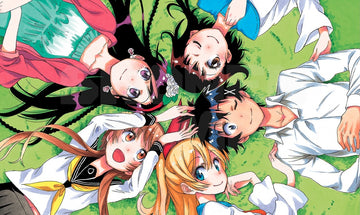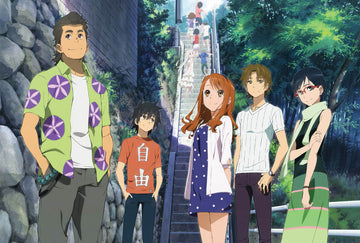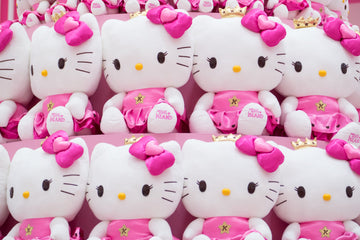Are you a fan of Japanese culture? Do you enjoy watching anime, reading manga, or eating sushi? If so, you might be surprised to learn that you already use several Japanese phrases and words in your daily life without even realizing it! In this article, we will explore some common Japanese expressions that have seamlessly made their way into our vocabulary. Not only will you discover these phrases, but you'll also learn how to use them properly. Let's dive in!
1. "Arigatou" - Thank You
One of the most well-known Japanese phrases is "arigatou," which means "thank you." This expression is often used to show appreciation and gratitude. Whether you're thanking someone for a small favor or expressing gratitude for a significant gesture, "arigatou" is the perfect phrase to use. For example:
- When your friend treats you to lunch, you can say, "Arigatou, [friend's name]! I really appreciate it."
- If someone holds the door open for you, a simple "Arigatou!" will suffice.
Using "arigatou" not only expresses your gratitude but also shows respect for Japanese culture and customs.
2. "Sayonara" - Goodbye
When bidding farewell, many of us find ourselves saying "sayonara" without realizing its Japanese origin. "Sayonara" means "goodbye" and is widely recognized around the world. While it can be used in formal settings, it is more commonly used in casual situations. Here are a couple of examples:
- When leaving a gathering, you can say, "Sayonara, everyone! Thanks for the great time!"
- If you're ending a phone conversation with a friend, a simple "Sayonara!" will do.
Using "sayonara" adds an exotic touch to your goodbyes and showcases your familiarity with Japanese culture.
3. "Sensei" - Teacher or Expert
In Japanese, "sensei" refers to a teacher or an expert in a specific field. You might be surprised to find that you use this term more often than you think, especially when referring to someone who has a higher level of knowledge or skill. For instance:
- When talking about your martial arts instructor, you can say, "My sensei taught me some incredible moves."
- If you have a mentor at work who guides you, you can refer to them as "sensei."
Embracing the term "sensei" acknowledges the wisdom and guidance you receive from those with more experience.
4. "Kawaii" - Cute
If you have a soft spot for cute animals, adorable characters, or anything that makes your heart melt, chances are you've used the word "kawaii" without realizing it. "Kawaii" is an adjective that translates to "cute" in English. It is a popular term in Japanese pop culture and is often associated with the famous Hello Kitty character. Here's how you can incorporate it into your daily conversations:
- When seeing a cute puppy, you can exclaim, "That dog is so kawaii!"
- If a friend shows you a picture of their newborn baby, you can say, "Aww, kawaii!"
By using "kawaii," you'll surely bring a smile to the faces of those around you while embracing the cuteness of Japanese culture.
5. "Sushi" - Sushi
Who doesn't love sushi? This delicious Japanese dish has gained immense popularity worldwide. Surprisingly, the word "sushi" itself is Japanese! Whenever you indulge in a plate of sushi or discuss your favorite types of sushi rolls, you're unknowingly using a Japanese word. For example:
- When recommending a sushi restaurant to a friend, you can say, "There's a fantastic sushi place downtown!"
- If you're craving sushi, you might say, "Let's have sushi for dinner tonight!"
Using the word "sushi" not only highlights your love for Japanese cuisine but also adds authenticity to your culinary discussions.
6. "Manga" - Manga
If you're a fan of comic books or graphic novels, you're likely familiar with the term "manga." Originating in Japan, manga refers to Japanese comics that cover a wide range of genres and are enjoyed by people of all ages. When discussing your favorite manga series or recommending one to a friend, you're incorporating this Japanese term into your everyday language. For instance:
- When chatting with a fellow manga enthusiast, you can ask, "Have you read the latest manga by [author's name]?"
- If a friend is interested in trying manga, you can suggest, "You should start with a classic manga like 'Naruto'."
Using the term "manga" not only showcases your passion for Japanese storytelling but also connects you with a vibrant and creative community.
7. "Emoji" - Emoji
In the digital age, emojis have become a universal language for expressing emotions through text messages and social media. However, did you know that the word "emoji" is derived from the Japanese language? In Japanese, "emoji" means "picture character." So, every time you use an emoji to convey your feelings, you're unknowingly incorporating a Japanese word into your online conversations. For example:
- When sharing your excitement about an upcoming event, you might add a 😃 emoji to your message.
- If you're feeling a bit under the weather, you could use a 🤒 emoji to let your friends know.
By using emojis, you're not only making your messages more expressive but also paying homage to their Japanese roots.
Conclusion
Japanese language and culture have undoubtedly influenced our daily lives in numerous ways. From expressing gratitude with "arigatou" to bidding farewell with "sayonara," these Japanese phrases seamlessly blend into our conversations. Incorporating words like "sensei," "kawaii," "sushi," "manga," and even "emoji" adds a touch of Japanese flair to our language, showcasing our appreciation for this fascinating culture. So, the next time you use one of these phrases, take a moment to appreciate the global connections and cultural diversity they represent.
Now that you're aware of these Japanese phrases hiding in plain sight, embrace them in your daily conversations and continue exploring the rich world of the Japanese language!
Note: This article is for informational purposes only and is not intended to teach Japanese language proficiency.
Sources:








